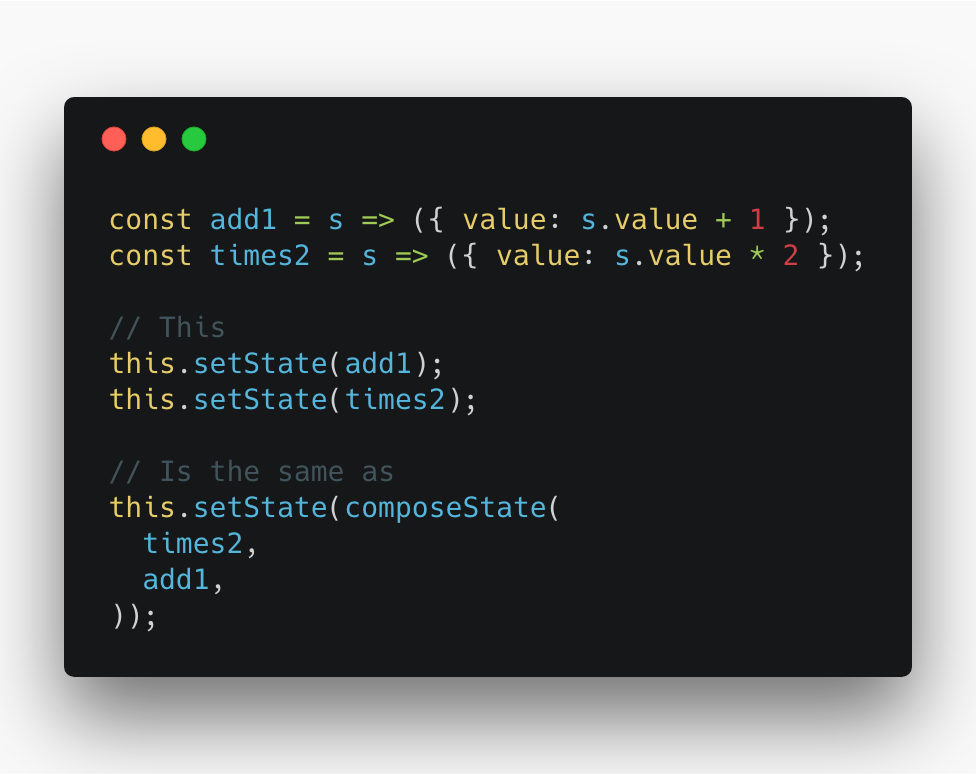
Security News
Oracle Drags Its Feet in the JavaScript Trademark Dispute
Oracle seeks to dismiss fraud claims in the JavaScript trademark dispute, delaying the case and avoiding questions about its right to the name.
compose-state
Advanced tools
compose-state is a library to compose multiple setState or getDerivedStateFromProps updaters in React.
compose-state accepts any valid updaters – objects or functions – and executes them in the standard compositional right-to-left order.

yarn add compose-state
npm install --save compose-state
import composeState from 'compose-state';
// or
import {
composeState,
composeDerivedStateFromProps,
} from 'compose-state';
Let's say you want to call setState and do two things
Both of these updaters need to be functional, since they rely on the previous state for their return values.
const updateScore = s => ({ score: s.score + 1 });
const logTime = s => ({ log: [...s.log, Date.now()] });
Normally, we would need to call setState for both of these functions
class Game extends Component {
onScore = () => {
this.setState(updateScore);
this.setState(logTime);
};
// ...
}
...or we rewrite the two updaters into one larger function.
const updateScoreLogTime = s => ({
score: s.score + 1,
log: [...s.log, Date.now()],
});
But with compose-state, we can keep these two updaters independent, and we won't have to bulk up our component code with more setState calls.
const updateScoreLogTime = composeState(updateScore, logTime);
class Game extends Component {
onScore = () => {
this.setState(updateScoreLogTime);
};
// ...
}
compose-state isn't dependent on React at all, it's just a big reducer function. This allows you to build and compose as many updaters as you want while keeping your actual component code simple and maintainable.
compose-state accepts both objects and functions, just like setState. This allows you to mix static and dynamic updaters without increasing the complexity of any individual parameter.
const defaultValue = { value: 0 };
const incrementOther = s => ({ other: s.other + 1 });
this.setState(
composeState(defaultValue, incrementOther)
);
compose-state comes with a composeDerivedStateFromProps function to use with React's new getDerivedStateFromProps lifecycle method.
const updater1 = (nextProps, prevState) => {
// ...
}
const updater2 = (nextProps, prevState) => {
// ...
}
class App extends Component {
static getDerivedStateFromProps = composeDerivedStateFromProps(
updater1, updater2
)
// ...
}
Functional setState is the future of React by Justice Mba
Best kept React secret: you can declare state changes separately from the component classes. by Dan Abramov
FAQs
Compose multiple setState or getDerivedStateFromProps updaters in React
The npm package compose-state receives a total of 4 weekly downloads. As such, compose-state popularity was classified as not popular.
We found that compose-state demonstrated a not healthy version release cadence and project activity because the last version was released a year ago. It has 1 open source maintainer collaborating on the project.
Did you know?

Socket for GitHub automatically highlights issues in each pull request and monitors the health of all your open source dependencies. Discover the contents of your packages and block harmful activity before you install or update your dependencies.

Security News
Oracle seeks to dismiss fraud claims in the JavaScript trademark dispute, delaying the case and avoiding questions about its right to the name.

Security News
The Linux Foundation is warning open source developers that compliance with global sanctions is mandatory, highlighting legal risks and restrictions on contributions.

Security News
Maven Central now validates Sigstore signatures, making it easier for developers to verify the provenance of Java packages.